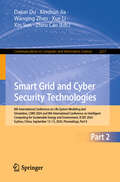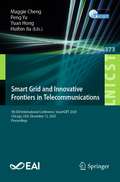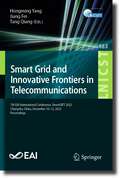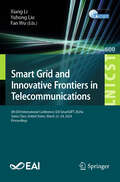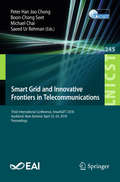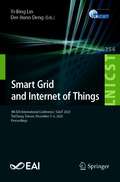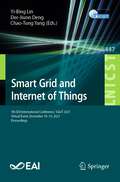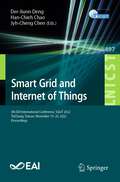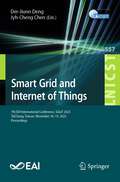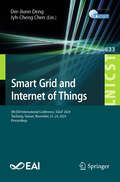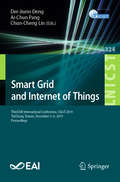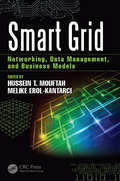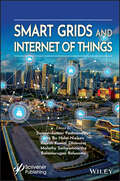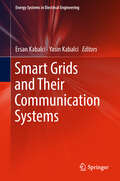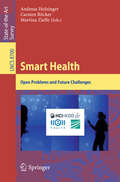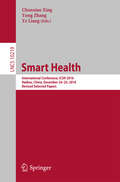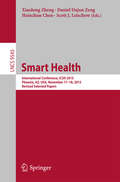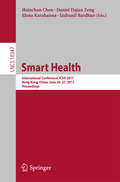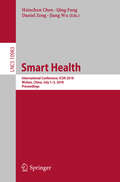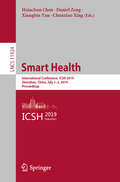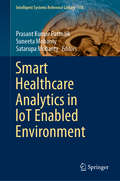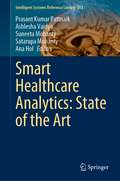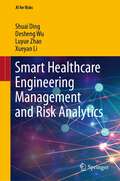- Table View
- List View
Smart Grid and Cyber Security Technologies: 8th International Conference on Life System Modeling and Simulation, LSMS 2024 and 8th International Conference on Intelligent Computing for Sustainable Energy and Environment, ICSEE 2024, Suzhou, China, September 13–15, 2024, Proceedings, Part II (Communications in Computer and Information Science #2217)
by Xin Sun Xue Li Dajun Du Xinchun Jia Wanqing Zhao Zhiru CaoThe five-volume set constitutes the thoroughly refereed proceedings of the 8th International Conference on Life System Modeling and Simulation, LSMS 2024, and of the 8th International Conference on Intelligent Computing for Sustainable Energy and Environment, ICSEE 2024, which were held during September 13-15, in Suzhou, China. The 34 papers presented were carefully reviewed and selected from over 496 submissions. The LSMS and ICSEE international conference series aim to bring together international researchers and practitioners in the fields of advanced methods for life system modeling and simulation, as well as advanced intelligent computing theory, methodologies, and engineering applications in achieving net zero across all sectors to tackle the global climate change challenge.
Smart Grid and Innovative Frontiers in Telecommunications: 5th EAI International Conference, SmartGIFT 2020, Chicago, USA, December 12, 2020, Proceedings (Lecture Notes of the Institute for Computer Sciences, Social Informatics and Telecommunications Engineering #373)
by Yuan Hong Peng Yu Maggie Cheng Huibin JiaThis book constitutes the refereed proceedings of the 5th International Conference on Smart Grid and Innovative Frontiers in Telecommunications, SmartGIFT 2020, held in Chicago, USA, in December 2020. Due to COVID-19 pandemic, the conference was held virtually.The 13 full papers were selected from 28 submissions and focus on the development of digital technology and smart grid which enables the smooth integration of centralised or distributed power generation, energy storage, and distribution. The papers are grouped thematically into: Communications, Networks and Services; Security and Stable Control; Internet of Power Things and Big Data.
Smart Grid and Innovative Frontiers in Telecommunications: 7th EAI International Conference, SmartGIFT 2022, Changsha, China, December 10-12, 2022, Proceedings (Lecture Notes of the Institute for Computer Sciences, Social Informatics and Telecommunications Engineering #483)
by Hongming Yang Jiang Fei Tang QiangThis book constitutes the refereed proceedings of the 7th International Conference on Smart Grid and Innovative Frontiers in Telecommunications, SmartGIFT 2022, held in Changsha, China, in December 10-12, 2022The 44 full papers were selected from 116 submissions and focus on new challenges and opportunities of intelligent technologies in new energy systems.The papers are the papers are divided into the following areas: Simulation and analysis of the integrated energy system, disaster prevention & reduction for power grid, industry 4.0 applications, flexible planning and regulation techniques in smart grids, smart control and diagnose of distributed power system, and control and operation of UAV. These sessions aimed to address the new dimension that can gain insights into key challenges, understanding, and criteria of new technologies to develop and implement future industry-related services and applications.
Smart Grid and Innovative Frontiers in Telecommunications: 8th EAI International Conference, EAI SmartGIFT 2024a, Santa Clara, United States, March 23-24, 2024, Proceedings (Lecture Notes of the Institute for Computer Sciences, Social Informatics and Telecommunications Engineering #600)
by Fan Wu Xiang Li Yuhong LiuThis book constitutes the refereed proceedings of the 8th EAI International Conference on Smart Grid Inspired Future Technologies, SmartGift 2024a, which was a virtual event, held during March 23–24, 2024. The 11 full papers presented in this volume were carefully reviewed and selected from 39 submissions. They are grouped into the following topics: wireless communication and distribution network; artificial intelligence technologies; security in wireless communication; system design for smart grid and IoT.
Smart Grid and Innovative Frontiers in Telecommunications: Third International Conference, SmartGIFT 2018, Auckland, New Zealand, April 23-24, 2018, Proceedings (Lecture Notes of the Institute for Computer Sciences, Social Informatics and Telecommunications Engineering #245)
by Peter Han Chong Boon-Chong Seet Michael Chai Saeed Ur RehmanThis book constitutes the proceedings of the Third International Conference on Smart Grid and Innovative Frontiers in Telecommunications, SmartGIFT, held in Auckland, New Zealand, in April 2018. The 28 revised full papers presented were carefully reviewed and selected from 44 submissions. They focus on smart grid as the next generation of electrical grid, which will enable the smart integration of conventional, renewable and distributed power generation, energy storage, transmission and distribution, and demand management. The benefits of smart grid include enhanced reliability and resilience, higher intelligence and optimized control, decentralized operation, higher operational efficiency, more efficient demand management, and better power quality.
Smart Grid and Internet of Things: 4th EAI International Conference, SGIoT 2020, TaiChung, Taiwan, December 5–6, 2020, Proceedings (Lecture Notes of the Institute for Computer Sciences, Social Informatics and Telecommunications Engineering #354)
by Der-Jiunn Deng Yi-Bing LinThis volume, SGIoT 2020, constitutes the refereed proceedings of the 4th EAI International Conference on Smart Grid and Internet of Things, SGIoT 2020, held in TaiChung, Taiwan, in December 2020.The IoT-driven smart grid is currently a hot area of research boosted by the global need to improve electricity access, economic growth of emerging countries, and the worldwide power plant capacity additions. The 40 papers presented were reviewed and selected from 159 submissions and present broad range of topics in wireless sensor, vehicular ad hoc networks, security, blockchain, and deep learning.
Smart Grid and Internet of Things: 5th EAI International Conference, SGIoT 2021, Virtual Event, December 18-19, 2021, Proceedings (Lecture Notes of the Institute for Computer Sciences, Social Informatics and Telecommunications Engineering #447)
by Der-Jiunn Deng Yi-Bing Lin Chao-Tung YangThis book constitutes the refereed proceedings of the 5th EAI International Conference on Smart Grid and Internet of Things, SGIoT 2021, held in TaiChung, Taiwan, in December 2021.The 9 regular papers and 4 short papers presented were carefully reviewed and selected from 57 submissions. The papers cover a broad range of topics in wireless sensor, vehicular ad hoc networks, security, deep learning and big data. The papers are organized in two subject areas: applications on internet of things, and communication security, big data, neural networks and machine learning.
Smart Grid and Internet of Things: 6th EAI International Conference, SGIoT 2022, TaiChung, Taiwan, November 19-20, 2022, Proceedings (Lecture Notes of the Institute for Computer Sciences, Social Informatics and Telecommunications Engineering #497)
by Han-Chieh Chao Der-Jiunn Deng Jyh-Cheng ChenThis book constitutes the refereed proceedings of the 6th EAI International Conference on Smart Grid and Internet of Things, SGIoT 2022, held in TaiChung, Taiwan, in November 19-20, 2022.The 33 regular papers presented were carefully reviewed and selected from 96 submissions. The papers cover a broad range of topics in wireless sensor, vehicular ad hoc networks, security, deep learning and big data. The papers are organized in subject areas as follows: IoT, Communication Security, Data Mining or Big Data; Artificial Intelligence, Machine Leaning, Deep Learning and Neural Network; WLAN, Wireless Internet and 5G; Protocol, Algorithm, Services and Applications.
Smart Grid and Internet of Things: 7th EAI International Conference, SGIoT 2023, TaiChung, Taiwan, November 18-19, 2023, Proceedings (Lecture Notes of the Institute for Computer Sciences, Social Informatics and Telecommunications Engineering #557)
by Der-Jiunn Deng Jyh-Cheng ChenThis book constitutes the refereed proceedings of the 7th EAI International Conference on Smart Grid and Internet of Things, SGIoT 2023, held in TaiChung, Taiwan, in November 18-19, 2023The 15 regular papers presented were carefully reviewed and selected from 38 submissions. The papers are organized in subject areas as follows: IoT, communication security, data mining and big data; WLAN, wireless internet and 5G; protocol, algorithm, services and applications.
Smart Grid and Internet of Things: 8th EAI International Conference, SGIoT 2024, Taichung, Taiwan, November 23–24, 2024, Proceedings (Lecture Notes of the Institute for Computer Sciences, Social Informatics and Telecommunications Engineering #633)
by Der-Jiunn Deng Jyh-Cheng ChenThis book constitutes the refereed proceedings of the 8th EAI International Conference on Smart Grid and Internet of Things, SGIoT 2024, held in Taichung, Taiwan, during November 23–24, 2024. The 19 full papers included in this book were carefully reviewed and selected from 45 submissions. They were organized in topical sections as follows: IoT, Artificial Intelligence, Edge Computing; Wireless Sensor Network, Mobile Robot, Smart Manufacturing; and Protocol, Algorithm, Services and Applications.
Smart Grid and Internet of Things: Third EAI International Conference, SGIoT 2019, TaiChung, Taiwan, December 5-6, 2019, Proceedings (Lecture Notes of the Institute for Computer Sciences, Social Informatics and Telecommunications Engineering #324)
by Der-Jiunn Deng Chun-Cheng Lin Ai-Chun PangThis book constitutes the refereed proceedings of the Third EAI International Conference on Smart Grid and Internet of Things, SGIoT 2019, held in TaiChung, Taiwan, in November 2019. The 10 papers presented were carefully reviewed and selected from 22 submissions and present results on how to achieve more efficient use of resources based largely on the IoT-based machine-to-machine (M2M) interactions of millions of smart meters and sensors in the smart grid specific communication networks such as home area networks, building area networks, and neighborhood area networks. The smart grid also encompasses IoT technologies, which monitor transmission lines, manage substations, integrate renewable energy generation. Through these technologies, the authorities can smartly identify outage problems, and intelligently schedule the power generation and delivery to the customers. Furthermore, the smart grid should teach us a valuable lesson that security must be designed in from the start of any IoT deployment.
Smart Grid in IoT-Enabled Spaces: The Road to Intelligence in Power
by Fadi Al-TurjmanInternet of Things (IoT)-enabled spaces have made revolutionary advances in the utility grid. Among these advances, intelligent and energy-efficient services are gaining considerable interest. The use of the smart grid is increasing day after day around us and is not only used in saving energy but also in our daily life for intelligent health, traffic, and even farming systems. The grid enabled with IoT features is also expected to communicate with cellular networks smoothly in the next-generation networks (6G and beyond). This will open the door for other interesting research areas. In this book, we consider the most significant and emergent research topics in this domain, addressing major issues and challenges in IoT-based solutions proposed for the smart grid. The chapters provide insight on comprehensive topics in IoT-based smart grids, combining technical aspects with the most up-to-date theory. It investigates the grid under varying and potential emerging paradigms such as edge/fog computing, in addition to big data aspects considerations in the IoT era. With comprehensive surveys and case studies, this book explores basic and high-level grid aspects in the emerging smart city paradigm, which makes it especially attractive to researchers, academics, and higher-level students. This authored book can be used by computer science undergraduate and postgraduate students, researchers and practitioners, city administrators, policymakers, and government regulators.
Smart Grid: Networking, Data Management, and Business Models
by Hussein T. Mouftah Melike Erol-KantarciSmart Grid: Networking, Data Management, and Business Models delivers a comprehensive overview of smart grid communications, discussing the latest advances in the technology, the related cyber security issues, and the best ways to manage user demand and pricing. Comprised of 16 chapters authored by world-renowned experts, this book: Considers the use of cognitive radio and software-defined networking in the smart grid Explores the space of attacks in the energy management process, the need for a smart grid simulator, and the management issues that arise around smart cities Describes a real-time pricing scheme that aims to reduce the peak-to-average load ratio Explains how to realize low-carbon economies and the green smart grid through the pervasive management of demand Presents cutting-edge research on microgrids, electric vehicles, and energy trading in the smart grid Thus, Smart Grid: Networking, Data Management, and Business Models provides a valuable reference for utility operators, telecom operators, communications engineers, power engineers, electric vehicle original equipment manufacturers (OEMs), electric vehicle service providers, university professors, researchers, and students.
Smart Grids and Internet of Things: An Energy Perspective
by Balamurugan Balusamy P. Sanjeevikumar Jens Bo Holm-Nielsen Rajesh Kumar Dhanaraj Malathy SathyamoorthySMART GRIDS AND INTERNET OF THINGS Smart grids and the Internet of Things (IoT) are rapidly changing and complicated subjects that are constantly changing and developing. This new volume addresses the current state-of-the-art concepts and technologies associated with the technologies and covers new ideas and emerging novel technologies and processes. Internet of Things (IoT) is a self-organized network that consists of sensors, software, and devices. The data is exchanged among them with the help of the internet. Smart Grids (SG) is a collection of devices deployed in larger areas to perform continuous monitoring and analysis in that region. It is responsible for balancing the flow of energy between the servers and consumers. SG also takes care of the transmission and distribution power to the components involved. The tracking of the devices present in SG is achieved by the IoT framework. Thus, assimilating IoT and SG will lead to developing solutions for many real-time problems. This exciting new volume covers all of these technologies, including the basic concepts and the problems and solutions involved with the practical applications in the real world. Whether for the veteran engineer or scientist, the student, or a manager or other technician working in the field, this volume is a must-have for any library. Smart Grids and Internet of Things: Presents Internet of Things (IoT) and smart grid (SG)-integrated frameworks along with their components and technologies Covers the challenges in energy harvesting and sustainable solutions for IoTSGs and their solutions for practical applications Describes and demystifies the privacy and security issues while processing data in IoTSG Includes case studies relating to IoTSG with cloud and fog computing machine learning and blockchain
Smart Grids and Their Communication Systems (Energy Systems In Electrical Engineering Ser.)
by Ersan Kabalci Yasin KabalciThe book presents a broad overview of emerging smart grid technologies and communication systems, offering a helpful guide for future research in the field of electrical engineering and communication engineering. It explores recent advances in several computing technologies and their performance evaluation, and addresses a wide range of topics, such as the essentials of smart grids for fifth generation (5G) communication systems. It also elaborates the role of emerging communication systems such as 5G, internet of things (IoT), IEEE 802.15.4 and cognitive radio networks in smart grids. The book includes detailed surveys and case studies on current trends in smart grid systems and communications for smart metering and monitoring, smart grid energy storage systems, modulations and waveforms for 5G networks. As such, it will be of interest to practitioners and researchers in the field of smart grid and communication infrastructures alike.
Smart Health
by Andreas Holzinger Carsten Röcker Martina ZiefleProlonged life expectancy along with the increasing complexity of medicine and health services raises health costs worldwide dramatically. Whilst the smart health concept has much potential to support the concept of the emerging P4-medicine (preventive, participatory, predictive, and personalized), such high-tech medicine produces large amounts of high-dimensional, weakly-structured data sets and massive amounts of unstructured information. All these technological approaches along with "big data" are turning the medical sciences into a data-intensive science. To keep pace with the growing amounts of complex data, smart hospital approaches are a commandment of the future, necessitating context aware computing along with advanced interaction paradigms in new physical-digital ecosystems. The very successful synergistic combination of methodologies and approaches from Human-Computer Interaction (HCI) and Knowledge Discovery and Data Mining (KDD) offers ideal conditions for the vision to support human intelligence with machine learning. The papers selected for this volume focus on hot topics in smart health; they discuss open problems and future challenges in order to provide a research agenda to stimulate further research and progress.
Smart Health
by Yong Zhang Chunxiao Xing Ye LiangThis book constitutes the thoroughly refereed post-conference proceedings of the International Conference for Smart Health, ICSH 2016, held in Haikou, Hainan, China, in December 2016. The 23 full papers presented were carefully reviewed and selected from 52 submissions. They are organized around the following topics: big data and smart health; health data analysis and management; healthcare intelligent systems and clinical practice; medical monitoring and information extraction; clinical and medical data mining.
Smart Health
by Hsinchun Chen Xiaolong Zheng Daniel Dajun Zeng Scott J. LeischowThis book constitutes the thoroughly refereedpost-conference proceedings of the International Conference for Smart Health,ICSH 2015, held in Phoenix, AZ, USA, in November 2015. The 33 papers presented together were carefully reviewedand selected from 43 submissions. The conference focused on topics and issuesincluding medical monitoring and information extraction, clinical and medicaldata mining, health data analysis and management, big data and smart health,and healthcare intelligent systems and clinical practice.
Smart Health
by Hsinchun Chen Daniel Dajun Zeng Elena Karahanna Indranil BardhanThis book constitutes the refereed proceedings of the International Conference for Smart Health, ICSH 2014, held in Beijing, China, in July 2014. The 21 papers presented together with 4 extended abstracts were carefully reviewed and selected from numerous submissions. The papers are organized in topical sections on information sharing, integrating and extraction; health data analysis and management; clinical and medical data mining; and clinical practice and medical monitoring.
Smart Health: International Conference, ICSH 2018, Wuhan, China, July 1–3, 2018, Proceedings (Lecture Notes in Computer Science #10983)
by Daniel Zeng Hsinchun Chen Jiang Wu Qing FangThis book constitutes the thoroughly refereed post-conference proceedings of the International Conference for Smart Health, ICSH 2018, held in Wuhan, China, in July 2018.The 14 full papers and 21 short papers presented were carefully reviewed and selected from 49 submissions. They focus on studies on the principles, approaches, models, frameworks, new applications, and effects of using novel information technology to address healthcare problems and improve social welfare. The selected papers are organized into the following topics: smart hospital; online health community; mobile health; medical big data and healthcare machine learning; chronic disease management; and health informatics.
Smart Health: International Conference, ICSH 2019, Shenzhen, China, July 1–2, 2019, Proceedings (Lecture Notes in Computer Science #11924)
by Daniel Zeng Hsinchun Chen Chunxiao Xing Xiangbin YanThis book constitutes the thoroughly refereed conference proceedings of the International Conference for Smart Health, ICSH 2019, held in Shenzhen, China, in July 2019. The 34 full papers and 1 short papers presented were carefully reviewed and selected from 43 submissions. In this book a lively exchange and collaborations between the growing international smart health research scholars and communities has been introduced, and to advance our understanding about the technical, practical, economic, behavioral, and social issues center on smart health . The selected papers are organized into the following topics: Precision Medicine and Telehealth, Social, Psychosocial and Behavioral Determinants of Health, Data science, Analytics, Clinical and Business Intelligence, Clinical Informatics and Clinician Engagement.
Smart Healthcare Analytics in IoT Enabled Environment (Intelligent Systems Reference Library #178)
by Prasant Kumar Pattnaik Suneeta Mohanty Satarupa MohantyThis book addresses various aspects of how smart healthcare can be used to detect and analyze diseases, the underlying methodologies, and related security concerns. Healthcare is a multidisciplinary field that involves a range of factors like the financial system, social factors, health technologies, and organizational structures that affect the healthcare provided to individuals, families, institutions, organizations, and populations. The goals of healthcare services include patient safety, timeliness, effectiveness, efficiency, and equity. Smart healthcare consists of m-health, e-health, electronic resource management, smart and intelligent home services, and medical devices. The Internet of Things (IoT) is a system comprising real-world things that interact and communicate with each other via networking technologies. The wide range of potential applications of IoT includes healthcare services. IoT-enabled healthcare technologies are suitable for remote health monitoring, including rehabilitation, assisted ambient living, etc. In turn, healthcare analytics can be applied to the data gathered from different areas to improve healthcare at minimum expense.
Smart Healthcare Analytics: State of the Art (Intelligent Systems Reference Library #213)
by Prasant Kumar Pattnaik Suneeta Mohanty Satarupa Mohanty Ashlesha Vaidya Ana HolThis edited book helps researchers and practitioners to understand e-health, m-healthcare architecture through IoT and the state of the art in IoT counter measures. This book provides a comprehensive discussion on a functional framework for IoT-based healthcare systems, intelligent medicine box, RFID technology, HMI, cognitive interpretation, BCI, remote health monitoring systems, wearable sensors, WBAN, healthcare analytics, machine learning (ML) techniques for IoT-enabled healthcare services, security and privacy issues in IoT-based healthcare monitoring systems. The book discusses integration of IoT with big data and cloud computing for solving several real-time problems by the use of smart healthcare applications. In these applications, the cloud computing provides a common workplace for IoT and big data, big data provides data analytics technology and IoT provides the source of data. It serves as a reference resource for researchers and practitioners in academia and industry.
Smart Healthcare Engineering Management and Risk Analytics (AI for Risks)
by Desheng Wu Xueyan Li Shuai Ding Luyue ZhaoThis book aims to stay one step beyond the innovations of information and communication technologies and smart healthcare management and provides an overview of the risks smart healthcare management could help to alleviate, and those risks it would create or amplify. Inclusive discussions of the core of smart healthcare services in the perspective of system engineering are enclosed, such as smart healthcare definition, data information knowledge service, and intelligent hospital management. Summaries of technological and theoretical innovations spanning each step of the modern healthcare system are included, from health screening, clinical diagnosis, cancer screening, to in-hospital mortality monitoring, minimally invasive surgeries, and medical data storages. Analytics of risks reduced and induced by these innovations are provided, with potential solutions to such risks in healthcare management discussed. This book seeks to provide demonstrative examples of incidence capable innovations of healthcare technologies, which, while greatly enhancing abilities of healthcare workers and institutions, could pose risks to patients and sometimes even greater threats to the integrity of the healthcare system. The style of the book is intended to be demonstrative but most suited for researchers and graduate students, explaining the methodology behind healthcare innovations, with some citations and some deep scholarly reference.
Smart Healthcare System Design: Security and Privacy Aspects (Advances in Learning Analytics for Intelligent Cloud-IoT Systems)
by Sk Hafizul Islam Debabrata SamantaThe purpose of this book is to help achieve a better integration between the work of researchers and practitioners in a single medium for capturing state-of-the-art IoT solutions in healthcare applications to address how to improve the proficiency of wireless sensor networks (WSNs) in healthcare. It explores possible automated solutions in everyday life, including the structures of healthcare systems built to handle large amounts of data, thereby improving clinical decisions; which is why this book will prove invaluable to professionals who want to increase their understanding of recent challenges in the IoT-enabled healthcare domain. The 14 chapters address various aspects of the IoT system, such as design challenges, theory, various protocols, and implementation issues, and also include several case studies. Smart Healthcare System: Security and Privacy Aspects covers the introduction, development, and applications of smart healthcare models that represent the current state-of-the-art of various domains. The primary focus will be on theory, algorithms, and their implementation targeted at real-world problems. It will deal with different applications to give the practitioner a flavor of how IoT architectures are designed and introduced into various situations. More particularly, this volume consists of 14 chapters contributed by authors well-versed in the subject who are devoted to reporting the latest findings on smart healthcare system design.
